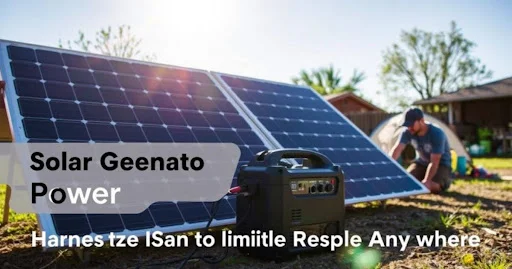Sometimes I just wish I had a way to keep my phone charged, run a fan, or light up a few things during a power outage, without the noise, smell, or hassle of a gas generator. The idea of using clean energy from the sun sounds amazing, but I never really understood how a Solar Generator works or if it’s even worth the cost.
Well, this blog post is here to clear all that up. Whether you’re camping, preparing for emergencies, or just want a backup power source, you’ll learn exactly what a solar generator is, how it works, and why it might be the smart, eco-friendly choice you’ve been looking for. Let’s break it down in simple terms so you can decide if it’s right for you.
There’s so much more to discover—browse our related posts!
What Is a Solar Generator and How Does It Work?
A solar generator is a portable power system that uses sunlight to create and store electricity. It usually includes solar panels, a battery, a charge controller, and an inverter. This setup lets you power small devices and appliances without using fuel or making noise.
Here’s how it works: the solar panels collect energy from the sun and send it to the battery. The battery stores that energy until you’re ready to use it. Then, the inverter changes the stored power into electricity your devices can use.
Key Components of a Solar Generator System
- Solar Panels: They capture sunlight and turn it into electricity.
- Battery: Stores the power so you can use it later, even when the sun isn’t shining.
- Charge Controller: Regulates the flow of energy to protect the battery from overcharging.
- Inverter: Converts stored energy into usable power for your devices and appliances.
- Power Ports/Outlets: Let you plug in phones, laptops, lights, and other electronics easily.
Top Uses of Solar Generators in Daily Life and Emergencies
Solar generators are perfect for daily use, like charging phones, running small fans, or powering lights during outdoor trips. They’re great for camping, RV living, or even just relaxing in the backyard. Quiet, clean, and easy to move, no gas needed.
In emergencies, they really shine. When the power goes out, you can still charge devices, keep medical gear running, or power a mini-fridge. They give peace of mind when storms, outages, or blackouts hit unexpectedly.
How to Choose the Right Solar Generator for Your Needs
Choosing the right solar generator starts with knowing what you’ll use it for. Do you need it for camping, home backup, or just charging devices? Think about how much power your gadgets need and how often you’ll use them.
Also, check the battery capacity, solar input, and how many outlets it has. Look for something portable if you plan to move it around. And don’t forget to read reviews, they’ll help you spot the best value for your budget.
Solar Generator vs. Gas Generator: A Clean Energy Comparison
Solar generators run quietly, don’t need fuel, and use clean energy from the sun. They’re perfect for indoor use, camping, and emergencies without harmful fumes. Plus, they’re low-maintenance and eco-friendly.
Gas generators, on the other hand, are powerful and good for running heavy tools or large appliances. But they’re noisy, need constant refueling, and produce pollution. If you want a cleaner, quieter option, solar wins for everyday and light backup use.
Tips to Maximize Efficiency and Lifespan of Your Solar Generator
To get the most out of your solar generator, always place the solar panels in direct sunlight. Clean the panels regularly so dust and dirt don’t block the sun’s energy. Also, avoid overloading the generator with too many devices at once.
For a longer lifespan, charge and discharge the battery properly and store it in a cool, dry place when not in use. Keep the battery from sitting empty for too long. Regular maintenance and smart usage will keep it running smoothly for years.
Common Myths and Misconceptions About Solar Generators
Many people think solar generators are too weak to power anything useful. But the truth is, modern models can run lights, laptops, small fridges, and more. Some even think they only work on sunny days, but they can still charge in cloudy weather, just slower.
Another common myth is that they’re too expensive. While some models are pricey, many affordable options are available for basic needs. Plus, you save money in the long run since you don’t buy fuel or pay high electricity bills.
FAQ’s
What is a solar generator used for?
A solar generator is used to power devices like phones, lights, and small appliances during camping, travel, or power outages. It’s a clean backup energy source.
Can a solar generator power a house?
A solar generator can’t run an entire house but can power essential devices like Wi-Fi, lights, and fans. It’s best for small-scale or emergency use.
How long can a solar generator last?
A solar generator can last up to 10 years or more with good care. Battery quality and proper use are key to a longer solar generator lifespan.
Are solar generators safe to use indoors?
Yes, a solar generator is safe for indoor use because it produces no fumes or noise. Unlike gas generators, a solar generator is clean and completely safe.
Do solar generators work at night?
A solar generator doesn’t collect energy at night but uses stored battery power. Charge it during the day so the solar generator can work after dark.
Conclusion
A solar generator is a smart, clean, and quiet way to power your devices anytime, anywhere. Whether you’re camping, facing a power outage, or just want to cut energy costs, it’s a reliable option that works without fuel or fumes. It’s safe for indoors and easy to use.
With the right solar generator, you can enjoy peace of mind, save money, and reduce your carbon footprint. Just choose one based on your needs, care for it properly, and you’ll have power when you need it most.
Don’t miss out on more great reads—click through our featured posts!






